Interviewer : Metalfreak
Interviewés : Mark Ruffneck (batterie) / Johnny Cross (guitares)
Metalfreak : Hello Oz, thanks for answering my questions. I’m trying a new form of interview for Soil Chronicles. I give you some Youtube links – between more classical questions – and you tell us what memories come back to you when you see them.
Bonjour Oz, merci de répondre à mes questions. J’essaie une nouvelle forme d’interview pour Soil Chronicles. Je vous donne quelques liens Youtube – parmi quelques questions plus classiques – et vous nous dites quels souvenirs vous reviennent lorsque vous les voyez.
Mark Ruffneck : The first album with OZ. Happy days. This video contains the album cover used in the second release of this album. This cover was made after Fire in the Brain album, because we had a new line-up and we didn’t like to use the old cover with the old line-up, so reprint got this cover. But now a little history lesson of OZ’s first album, where this song Hey You was like the first song on that album. We started out as a cover band in Finland and we didn’t think about creating our own music, just playing on stage covers and we liked it. We played Led Zeppelin, Black Sabbath, BTO, Alice Cooper, UFO songs on stage and we were happy with that. After a time on tour in Finland, our booking manager told us that we should make our own music and also make our own album. And we wandered why ?, but after a while we had made several songs for the first OZ album. We recorded these songs in the MSL studio, Tampere, Finland and sent cassettes with these songs to some Finnish record companies, but they showed no interest in OZ music. We went back to the studio and also two of our good friends, older musicians, helped OZ there and now we had a good demo tape. We probably visit all record companies in Finland (there weren’t that many at that time, probably 4 or 5) and the same story! They were not interested in OZ music. This was probably 80 or 81. Shortly after that we went east to Stockholm, Sweden and we signed a record contract with Tyfon Grammofon AB, which was owned by Börje Forsberg. In the winter of 1982 we were on our way to Stockholm and recorded OZ’s first album. What amazing memories. OZ album was released in 1982 in Sweden, but also in Finland with a license agreement with Finnlevy, which Börje managed to do with the Finnish company. What a crazy start for OZ recording sessions. Still feels good when Finnlevy showed OZ a door when we visited their office earlier, but later on they pay a license agreement to the Swedish record company to release OZ album in Finland. There are many other stories to tell about from this first recording session in Decibel Studio, Stockholm, but I will talk about it some other time.
Le premier album avec Oz, de bons souvenirs ! Cette vidéo contient la pochette de l’album utilisée dans la deuxième version de ce dernier. Cet artwork a été fait après l’album « Fire in the Brain« , parce que nous avons changé de line-up et nous n’avons pas voulu conserver l’ancien artwork, donc on l’a refaite.
Mais maintenant, une petite leçon d’histoire du premier album d’Oz, où cette chanson « Hey you » était le premier morceau. Nous avons commencé en tant que groupe de reprises en Finlande et n’avons pas pensé à composer notre propre musique, juste jouer des reprises sur scène et nous avons aimé ça. Nous avons joué des chansons de Led Zeppelin, Black Sabbath, BTO, Alice Cooper, UFO sur scène et nous en étions satisfaits.
Après une tournée en Finlande, notre booking manager nous a dit que nous devrions écrire notre propre musique et aussi faire notre propre album. Et nous nous demandions pourquoi, mais après un certain temps, nous avions fait plusieurs morceaux pour le premier album d’Oz. Nous les avons enregistrés dans le studio MSL, Tampere (Finlande) et envoyé des cassettes avec ces chansons à certaines maisons de disques finlandaises, mais elles ne manifestaient aucun intérêt pour la musique d’Oz. Nous sommes retournés au studio et aussi deux de nos bons amis, des musiciens plus âgés, ont aidé Oz et maintenant nous avons une bonne cassette de démo. Nous visitions probablement toutes les maisons de disques en Finlande (il n’y en avait pas beaucoup à l’époque, probablement 4 ou 5) et c’était la même histoire ! Ils n’étaient pas intéressés par la musique Oz. C’était probablement en 1980 ou 1981.
Peu de temps après, nous sommes allés vers l’est à Stockholm, en Suède, et nous avons signé un contrat avec Tyfon Grammofon AB, qui appartenait à Börje Forsberg. En hiver 1982, nous étions en route pour Stockholm et avons enregistré le premier album d’Oz. Quels souvenirs incroyables ! L’album « The Oz » est sorti en 1982 en Suède, mais aussi en Finlande avec un accord de licence avec Finnlevy, que Börje a réussi à faire avec la société finlandaise. Quel début fou pour les sessions d’enregistrement de « The Oz » ! Cela fait toujours du bien quand Finnlevy a frayé à Oz un chemin lorsque nous avons visité leur bureau plus tôt. Mais plus tard, ils ont payé un accord de licence à la maison de disques suédoise pour sortir l’album « The Oz » en Finlande. Il y a beaucoup d’autres histoires à raconter de cette première session d’enregistrement au Decibel Studio, Stockholm, mais j’en parlerai une autre fois.
Mark Ruffneck : The first OZ album with a new line-up (Ape, Jay, Speedy, Spooky, Mark). This album changed our lives. Fire in the Brain was OZ’s second album and with this album we become an international player on music business. Fire in the Brain is the name of this song and also the name of OZ’s second album. We recorded this song and the entire album in the summer of 1983 at Electra Studio, Stockholm, Sweden. We were completely in the studio for 3-4 weeks and we recorded the album and right after that we mixed it. Initially, this album was released in Sweden, but Börje also send copies of the album to various record companies around the world and a few weeks later started the fax machine in his office to sing. There was no internet or email at the time and everything in business was handled by letters, phone or fax. So pretty soon Börje had signed licensing agreements with different record companies in USA, Canada, Japan and Europe. Börjes company Tyfon Grammofone AB and its label Waves will become an international player in the Heavy Metal music business with OZ Fire on the Brain album. Pretty fun, because we were originally a Finnish band and now we went into International music business from Stockholm, Sweden. We moved to Stockholm pretty quickly after Fire in the Brain was released around the world. So this song and album was a major player for my and OZ’s future.
Le premier album de Oz avec un nouveau line-up (Ape, Jay, Speedy, Spooky, Mark). Cet album a changé nos vies. « Fire in the Brain » était le deuxième album d’Oz et avec celui-ci, nous devenons un acteur international dans le domaine de la musique. « Fire in the Brain » est le nom de cette chanson et aussi le nom du deuxième album d’Oz. Nous avons enregistré cet toute et l’album entier en été 1983 à Electra Studio, Stockholm, Suède. Nous étions complètement en studio pendant trois-quatre semaines et nous avons enregistré l’album, et juste après nous l’avons mixé. Initialement, cet album est sorti en Suède, mais Börje a également envoyé des copies de l’album à diverses maisons de disques du monde entier et quelques semaines plus tard, il a commencé à chanter le télécopieur de son bureau. Il n’y avait ni Internet ni e-mail à l’époque et tout dans les affaires était géré par lettres, téléphone ou fax. Börje avait donc signé très rapidement des accords de licence avec différentes maisons de disques aux États-Unis, au Canada, au Japon et en Europe. La société Börjes Tyfon Grammofone AB et son label Waves deviendront un acteur international dans le secteur de la musique Heavy Metal avec Oz sur l’album « Fire in the Brain« . Assez amusant, parce que nous étions à l’origine un groupe finlandais et maintenant que nous nous sommes lancés dans le commerce international de musique depuis Stockholm, en Suède. Nous avons déménagé à Stockholm assez rapidement après la sortie de « Fire in the Brain » dans le monde entier. Cette chanson et cet album ont donc été un acteur majeur pour mon avenir et celui d’Oz.
Mark Ruffneck : The first album that we made in Stockholm, when we had moved there after Fire in the Brain album. We all members of the band were living now in Stockholm and could totally focuse for OZ. We were playing some live shows also, but not so much as we were doing when we were living in Finland. In that time we were playing live almost every weekend. Third Warning, The song and also the album was the third album of OZ and I believe that we even knew the album name before we started to the recording work at Electra studio. We liked to have in this time a produser (to get a great sound for the new album) and we had also a several names to present to Börje, but he say no and told that we will do as we have done before with OZ earlier albums. He will produse III Warning album together with OZ. We had some disscussions about that and at the end Börje used his power as the record company owner against OZ and there were no more to talk about it. So this recording was not starting so well, but we got more time in the studio and we shoud do everything the best way to get a good results. Well, we moved to new country and had contract with Börje, so we were in that time in a bad situation with the band. Recording was working well in the beginning, but after some weeks Börje got in his mind a new deadline, becouse he liked to have album ready before he was traveling somewhere, maybe Cannes Music festival. Anyway, the last days were a real nightmare in the studio and specially the last day. We were recording Vocals and Guitar solos in a speed of light and a lot of Guitar works, Vocal and Background vocals were just deleted, becouse Mr Forsberg had his deadline and there were no discussions about that. We as a band was totally in that bad situation, becouse we had leaved our lives in Finland, moved to Stockholm and now Mr Forsberg showed his new face, a Total Dictator. We could had been leaving the studio in that time, but probably we had never released any music after that as OZ, so we were forced to do what we could in that kaotic situation. So the last part of recording was done and we were standing outside of the studio and Mr Forsberg jumped in the cab and drove at his home. What a crazy ending for the recording of III Warning. Later on Börje mixed that album by himself and some weeks later he call me and say OZ can come to his office. He gave one album to everyone and say let’s listen the new OZ album. He told us that this was the new Heavy Metal sound and but the LP on. The situation was really abstract, totally from outher space. It sounded bad, really bad and everybody were sitting totally paralysed and we couldn’t say anything. The really bad nightmare, we were working so much for this album and this was the result. Then he probably could see that we were not so impressed about III Warning album, so he told us that we have to leave he had a lot of work to do. So we left and at home we were listening III Warning several times and Jay try everything with his music systems and told, I can’t get this shit sounds good ! Yes, that was the reality, III Warning sound so bad that I couldn’t listen that album after that day in many years. So Happy days in Stockholm were ending. In that time we realised who Mr. Forsberg was and If he was alone he could destroy any album when he was mixing that alone !
Le premier album que nous avons fait à Stockholm, quand nous y avions emménagé après l’album « Fire in the Brain« . Tous les membres du groupe vivions maintenant à Stockholm et pouvions nous concentrer totalement sur Oz. Nous jouions aussi quelques concerts, mais pas autant que nous le faisions lorsque nous vivions en Finlande. À cette époque, nous jouions en live presque tous les weekends. « Third warning » était le troisième album d’Oz et je crois que nous connaissions même le nom de l’album avant de commencer le travail d’enregistrement au studio Electra. Nous aimions avoir à cette époque un producteur (pour obtenir un excellent son pour le nouvel album) et nous avions aussi plusieurs noms à présenter à Börje, mais il dit non, que nous ferons comme nous l’avions fait auparavant avec les précédents albums d’Oz . Il produira l’album « III Warning » avec Oz. Nous avons eu quelques discussions à ce sujet et à la fin, Börje a utilisé son pouvoir en tant que propriétaire de la maison de disques contre Oz et il n’y avait plus rien à en dire.
Cet enregistrement ne commençait pas si bien, mais nous avons eu plus de temps en studio et nous devons tout faire pour obtenir de bons résultats. Eh bien, nous avons déménagé dans un nouveau pays et avons eu un contrat avec Börje, donc nous étions à cette époque dans une mauvaise situation avec le groupe. L’enregistrement fonctionnait bien au début, mais après quelques semaines, Börje a pensé à un nouveau délai, car il aimait avoir un album prêt avant de partir en voyage, peut-être le festival de musique de Cannes. Quoi qu’il en soit, les derniers jours ont été un vrai cauchemar en studio et surtout le dernier jour. Nous enregistrions des solos de chant et de guitare à la vitesse de la lumière et beaucoup de guitares, de chant et de fond ont juste été supprimés, car M. Forsberg avait une date limite et il n’y a eu aucune discussion à ce sujet.
En tant que groupe, nous étions totalement dans cette mauvaise situation, car nous avions quitté notre vie en Finlande, déménagé à Stockholm et maintenant M. Forsberg a montré son nouveau visage, un vrai dictateur !
Nous aurions pu quitter le studio à cette époque, mais nous n’avions probablement jamais sorti de musique après cela en tant qu’Oz, nous avons donc été obligés de faire ce que nous pouvions dans cette situation chaotique. La dernière partie de l’enregistrement a donc été réalisée et nous nous tenions à l’extérieur du studio. M. Forsberg a sauté dans le taxi et est rentré chez lui.
Quelle fin pour l’enregistrement de « III Warning » ! Plus tard, Börje a mixé cet album lui-même et quelques semaines plus tard, il m’a appelé et m’a dit que Oz pouvait venir à son bureau. Il a donné un album à tout le monde et a leur a demandé d’écouter le nouvel album d’Oz. Il nous a dit que c’était le nouveau son Heavy Metal et le LP en marche. La situation était vraiment abstraite, totalement étrangère à l’espace. Cela sonnait mauvais, vraiment mauvais et tout le monde était assis, totalement paralysé, nous ne pouvions rien dire. Le cauchemar, c’était vraiment mauvais, nous avons tellement travaillé pour cet album.
Ensuite, il a probablement pu voir que nous n’étions pas si impressionnés par l’album « III Warning« , alors il nous a dit que nous devions partir, il avait beaucoup de travail à faire. Nous sommes donc partis et à la maison, nous avons écouté « III Warning » plusieurs fois et Jay a tout essayé avec ses logiciels de traitement et a dit que je ne pouvais pas avoir cette merde qui sonne bien ! Oui, c’était la réalité, « III Warning » sonnait tellement mal que je ne pouvais pas écouter cet album après ce jour depuis de nombreuses années. Les jours heureux à Stockholm se terminaient donc. Pendant ce temps, nous avons réalisé qui était M. Forsberg et s’il était seul, il pourrait détruire n’importe quel album s’il mixait cela seul !
Metalfreak : Following these two albums « Fire in the brain » and « III warning », Oz saw four of his titles finish on the « Scandinavian Metal attack » I and II compilations. Did it really help Oz to get known all over Europe ?
Suite à ces deux albums « Fire in the brain » et « III warning« , Oz a vu quatre de ses titres se terminer sur les compilations « Scandinavian Metal attack » I et II. Cela a-t-il vraiment aidé Oz à se faire connaître dans toute l’Europe ?
Mark Ruffneck : Yes, I think so. Börje Forsberg liked to release some compilation albums and of cause we were there too. OZ was in that time the main act at his Record Company together with Swedish band Trash, but he started to sign other bands to his Record Company, too. These new signed bands got possibility to record 2 songs and be a part of Scandinavian Metal Attack I and II. In that time Heavy Metal was popular music, so record companies were looking for the new artists and the same was also happening with Börje. He signed more bands in his company. I like to say here that Scandinavian Metal Attack I was released after Fire in the Brain album and Scandinavian Metal Attack II was released after III Warning album. I also liked to tell here that I was a relly good friend with Börje and His son Thomas (who become Quorthon later on) and I was as a part of his family. We talked many times together and listening and looking different albums from different bands around the world that Börje had got in his company and some of those albums he also released in Sweden. One of those bands that was released in Sweden with his company after our diccussions was Halloween from Germany. And I believe that he released also some other bands in Sweden from smaller companies from Europe
Oui, je le pense. Börje Forsberg aimait sortir quelques albums de compilation et pour cause nous y étions aussi. Oz était à cette époque le groupe principal de sa maison de disques avec le groupe suédois Trash, mais il a également commencé à signer d’autres groupes avec sa maison de disques. Ces nouveaux groupes signés ont eu la possibilité d’enregistrer deux chansons et de faire partie de Scandinavian Metal Attack I et II. A cette époque, le Heavy Metal était une musique populaire, donc les maisons de disques recherchaient les nouveaux artistes et il en allait de même avec Börje. Il a signé plus de groupes dans son entreprise. J’aime dire ici que Scandinavian Metal Attack I est sorti après l’album « Fire in the Brain » et Scandinavian Metal Attack II est sorti après l’album « III Warning« . J’ai également aimé dire ici que j’étais un très bon ami de Börje et son fils Thomas (qui deviendra Quorthon plus tard) et que je faisais partie de sa famille. Nous avons discuté plusieurs fois ensemble, écouté et cherché différents albums de différents groupes à travers le monde que Börje avait obtenus dans sa société et certains de ces albums qu’il a également sortis en Suède. Un de ces groupes qui est sorti en Suède avec sa compagnie après nos discussions était Halloween d’Allemagne. Et je crois qu’il a aussi sorti quelques autres groupes en Suède de plus petits labels d’Europe
Mark Ruffneck : The first song that was created in Stockholm. A great feeling when we recorded it. Börje also believed OZ and we could release this special song as a Maxi single. Many bigger and more famous bands made Maxi singles during that time, because you could get better sound when you only recorded one or two songs on the side of the Maxi single. We recorded and mixed Turn the Cross Upside Down over a long weekend and we used Stockholm Recording Studio. We tested this studio, if it was OK and we found out it was a good place. We used that studio a few years later, when we were recording and mixing the Decibel Storm album.
La première chanson a été écrite à Stockholm. Une émotion intense quand nous l’avons enregistré. Börje croyait aussi que nous pourrions sortir cette chanson spéciale en M45t. Beaucoup de groupes plus grands et plus célèbres ont fait des singles M45t pendant cette période, car vous pouvez obtenir un meilleur son lorsque vous enregistrez seulement une ou deux chansons sur le côté du single Maxi. Nous avons enregistré et mixé « Turn the Cross Upside Down » pendant un long week-end et nous avons utilisé Stockholm Recording Studio. Nous avons testé ce studio, si c’était OK et nous avons découvert que c’était un bon endroit. Nous avons utilisé ce studio quelques années plus tard, alors que nous enregistrions et mixions l’album « Decibel Storm« .
Metalfreak : I read somewhere that after Oz got a royalty check for « Turn the Cross Upside Down » to the amount of SEK 666, Jay C. Blade (bass, backing vocals from 1982 to 1987 and from 2010 to 2013) decided to stop writing satanic songs. Is it right ?
J’ai lu quelque part qu’après qu’Oz a obtenu un chèque de royalties pour « Turn the Cross Upside Down » au montant de 666 couronnes, Jay C. Blade (basse, choeurs de 1982 à 1987 et de 2010 à 2013) a décidé d’arrêter d’écrire des chansons sataniques. Est ce juste ?
Mark Ruffneck : Yes, in partly. We were at my home reading all kinds of lists about selling albums here and there. We were, both OZ and Börje in my place and we sat there calculating royalties and suddenly Jay started laughing and screaming. Look at that page and the line there. And we all saw the line he was pointing at and on that line was number 666. It was a cool thing and of course a sign from someone to someone. So it wasn’t a royalty check, it was a royalty from some country or company. But it was a fun thing that just happened to that song and we got a good laugh with it. Jay always had the great freedom to write all the lyrics he wanted, as did the other lyrical writers, too. OZ is unpolitical and not religious band, so there is quite a lot of freedom to write any kind of text you like. We are just a storyteller.
Oui, en partie. Nous étions chez moi en train de lire toutes sortes de listes sur la vente d’albums ici et là. Nous étions, Oz et Börje chez moi à calculer les redevances et soudainement Jay a commencé à rire et à crier. « Regardez cette page et cette ligne là-bas ! ». Et nous avons tous vu la ligne qu’il pointait, et sur cette ligne il y avait le numéro 666. C’était super cool et bien sûr un signe. Ce n’était donc pas un chèque de royalties, c’était une redevance d’un pays ou d’une entreprise. Mais c’était amusant ce qu’il arrivait à cette chanson et nous avons bien ri. Jay a toujours eu la grande liberté d’écrire toutes les paroles qu’il voulait, tout comme les autres auteurs. Oz est un groupe ni politique ni religieux, il y a donc beaucoup de liberté pour écrire n’importe quel type de texte que vous aimez. Nous ne sommes que des conteurs.
Mark Ruffneck : One and only cover song that we have recorded and it will be so, too. Before we started recording of the 4th OZ album Decibel Storm, we discussed creating a cover song for some popular song, which has not been used with any other band. Somehow we chose Teenage Rampant by Sweet and we recorded that song as part of the album Decibel Storm. We also looked at the US market and Quiet Riot had done mega hits with Slade’s songs, « Cum on Feel the Noize » and « Mama Weer All Crazee Now », so We tried that trick as well.
Notre seule et unique reprise que nous avons enregistrée et il en sera de même. Avant de commencer l’enregistrement du quatrième album d’Oz, « Decibel Storm« , nous avons discuté de l’idée d’une reprise d’une chanson populaire, qui n’avait pas été reprise par aucun autre groupe. D’une certaine manière, nous avons choisi « Teenage Rampant » de Sweet et nous avons enregistré cette chanson dans le cadre de l’album « Decibel Storm« . Nous avons également regardé le marché américain et Quiet Riot avait fait des méga hits avec des chansons de Slade : « Cum on Feel the Noize » et « Mama Weer All Crazee Now », alors nous avons également tenté cette voie.
Mark Ruffneck : A long and lonely road to get this point, but cool memories. We recorded this album in West Berlin, in the Sky Trak studio. Really different trip to Berlin … Really cool memories.
Roll the dice, a song and the album. Too long story to tell here, but shortly I can say that a lot of work to get the band back on the safe road and back to the studio. The recording work at Sky Trak studio also included computers and there the nightmare began. We were able to record all vocals, guitars, drums and bass in the Sky Track studio and later we continued to work with the rest of the recording and mixing in Montezuma Studio in Stockholm. More computers and now we were at a time when computers and various computer programs were not so advanced. Dat tape here and there. When we were ready with the final mix of Roll the Dice album, it sounded good. Then again we made a mistake, we leaved Börje Forsberg alone with Roll the Dice Mastering and he did it again! You barely heard the Vocals, guitars are missing and the generally speaking the sound of that album is really weird.
Une longue route solitaire pour arriver à ce point, mais des souvenirs sympas. Nous avons enregistré cet album à Berlin-Ouest, dans le studio Sky Trak. Un voyage vraiment différent à Berlin… Des souvenirs vraiment cool.
« Roll the dice », une chanson et l’album. L’histoire est trop longue à raconter ici, mais en peu de temps, je peux dire qu’il y a eu beaucoup de travail pour remettre le groupe sur la bonne voie et retourner au studio. Le travail d’enregistrement au studio Sky Trak comprenait également des ordinateurs et c’est là que le cauchemar a commencé. Nous avons pu enregistrer toutes les voix, guitares, batterie et basse dans le studio Sky Track et plus tard nous avons continué à travailler avec le reste de l’enregistrement et du mixage au Montezuma Studio à Stockholm. Plus d’ordinateurs et maintenant nous étions à une époque où les ordinateurs et divers programmes informatiques n’étaient pas aussi avancés. Des bandes de données par ici et là. Quand nous étions prêts avec le mix final de l’album « Roll the Dice« , ça sonnait bien. Ensuite, nous avons fait une erreur, nous avons laissé Börje Forsberg seul avec le mastering de « Roll the Dice » et il l’a fait à nouveau ! Vous avez à peine entendu les voix, les guitares manquent et le son de cet album est vraiment bizarre.
Metalfreak : What did Oz (and you, Mark) from 1991 to 2010 ? Is it because Oz had recurring line up problems that he stopped for so long ?
Qu’ont fait les membres de Oz (et toi, Mark) de 1991 à 2010 ? Est-ce à cause des problèmes récurrents de line-up qui ont fait que Oz a arrêté si longtemps ?
Mark Ruffneck : No , in 1991 we had a lot of troubles with OZ and some of members lack of motivation, so I told Ape, let’s take a break and think what we like to do ? The break was 20 years !
So, we stoped playing with OZ and we started to do some other things. I started to study Chemistry in Stockholm University and in that point I thought that I will never ever play more drums, so I sold my drums and started to study. Quite soon after that I got also my son, so I become a family father and I tought that, this is my life. So, OZ was faded away and we were living normal family lifes, without any connection to music business.
Non, en 1991, nous avons eu beaucoup de problèmes avec Oz et certains membres manquaient de motivation, alors j’ai dit à Ape « faisons une pause et réfléchissons à ce que nous aimons faire »… La pause a duré 20 ans!
Nous avons donc arrêté de jouer avec Oz et nous avons commencé à faire d’autres choses. J’ai commencé à étudier la chimie à l’Université de Stockholm et à ce moment-là, je pensais que je ne jouerai plus jamais de batterie, alors j’ai vendu mes batteries et j’ai commencé à étudier. Peu de temps après, j’ai aussi eu mon fils, alors je suis devenu père de famille et j’ai pensé que c’était ma vie. Ainsi, Oz a disparu et nous menions une vie de famille normale, sans aucun lien avec les affaires musicales.
Mark Ruffneck : The first video with OZ. Happy days again. Afterburning Time. I started OZ again, when my academic career ended at the Royal Institute of Technology. I just liked to do something fun again and playing Drums in OZ was pretty fun in the 80’s. So I got in touch with Jay C. Blade and we started planning to do some new songs together and after a while I called Ape and he was also back while he was thinking about a short time. We gathered our friends, Markku and Costi on guitars and we were ready to go. We planned to record just a few songs for fun in the beginning, but soon we figured out that it is better to create the whole album and we did. Dominator is the first song, with video from the album Burning Leather, which we released in 2011.
La première vidéo avec Oz. Encore des jours heureux. Temps de postcombustion. J’ai recommencé Oz, lorsque ma carrière universitaire s’est terminée au Royal Institute of Technology. J’aimais juste refaire quelque chose d’amusant et jouer de la batterie dans Oz était plutôt amusant dans les années 80. J’ai donc pris contact avec Jay C. Blade et nous avons commencé à réfléchir à de nouvelles chansons ensemble et, après un certain temps, j’ai appelé Ape et il était également de retour alors qu’il pensait à peu de temps. Nous avons réuni nos amis, Markku et Costi sur des guitares et nous étions prêts à partir. Nous avions prévu d’enregistrer quelques chansons pour le plaisir au début, mais nous avons vite compris qu’il était préférable de créer l’album entier et nous l’avons fait. « Dominator » est la première chanson, avec la vidéo de l’album « Burning Leather« , que nous avons sorti en 2011.
Metalfreak : Why did you re-record some old tracks for this album ?
Pourquoi avoir réenregistré d’ancien titres pour cet album ?
Mark Ruffneck : Technical reasons for the bad situation with the old record company (Black Mark) and Börje Forsberg. We recorded some old songs, because this way we could make the songs sounded the way we thought they would be sounded in 80’s, if we have been in the mixing room. We could also in that way presented a good package of OZ music to people and showed how we were as a band in 2011.
Raisons techniques de la mauvaise situation avec l’ancienne maison de disques (Black Mark) et Börje Forsberg. Nous avons enregistré quelques vieilles chansons, parce que, de cette façon, nous pourrions faire sonner les chansons de la façon dont nous pensions qu’elles auraient du l’être dans les années 80, si nous étions dans la salle de mixage. Nous pourrions aussi de cette façon présenter beaucoup de musique de Oz aux gens et montrer comment nous étions en tant que groupe en 2011.
Mark Ruffneck : New video and new lineup … Good memories here too. OZ , Mk V (Vince, Johnny, Juzzy, Peppi, Mark) « Bone Crusher », the first song from the « Transition State » album, was released in 2017. Again, a long and bumby road to get into the situation when the « Transition State » album was released. Making this album was the biggest nightmare, where I’ve been in my life and I hope that I don’t need to go through something like this again in my life. When we took one step forward, quite soon after that we were gliding back and we started again at the same point. Getting « Transition State » album ready, was the best Proof that with this new line-up we can do miracles, if we just like to do those.
Nouvelle vidéo et nouveau line up … De bons souvenirs ici aussi. Oz mark V (Vince, Johnny, Juzzy, Peppi, Mark) « Bone Crusher », la première chanson de l’album « Transition State« , est sortie en 2017. Encore une fois, une route longue et cahoteuse pour se retrouver dans la situation lorsque l’album « Transition State » est sorti. Faire cet album a été le plus grand cauchemar, où j’ai été dans ma vie et j’espère que je n’aurai plus besoin de vivre quelque chose comme ça dans ma vie. Lorsque nous avons fait un pas en avant, peu de temps après, nous reculions et nous avons recommencé au même point. Préparer l’album « Transition State« , était la meilleure preuve que, avec ce nouveau line up, nous pouvons faire des miracles, si nous voulons simplement les faire.
Metalfreak : I found « Transition state » more hard rock and less heavy metal than your others albums : was it a real « transition » for the future ?
J’ai trouvé « Transition state » plus hard rock et moins heavy metal que les autres albums : était-ce une vraie « transition » pour le futur ?
Mark Ruffneck : The « Transition State » as an album just showed that OZ was in Transition State, a point where there is no chance to return … New lineup and new album. Be reborn. Of course, the new line-up and new songwriters changed the OZ sound and probably also some of the overall style, but I saw it as a natural progression with the band, and I didn’t think it was a bad thing. As I said earlier, making the Transition State album was so complicated and took so much energy and time that I didn’t have a chance to think of any “deeper messages” that this album could give the audience. And to be honest here, I never analyze OZ albums, I think it’s better if other people do it. So, I can’t say by myself if Transition State is more Hard Rock that other albums.
La « Transition State » en tant qu’album vient de montrer que Oz était dans un état de transtition, un point où il n’y a aucune chance de revenir … Nouveau line up et nouvel album. Renaître. Bien sûr, la nouvelle formation et les nouveaux auteurs-compositeurs ont changé le son de Oz et probablement aussi une partie du style global, mais je l’ai vu comme une progression naturelle avec le groupe, et je ne pensais pas que c’était une mauvaise chose. Comme je l’ai dit plus tôt, faire l’album « Transition State » était si compliqué et prenait tellement d’énergie et de temps que je n’ai pas eu la chance de penser à des « messages plus profonds » que cet album pourrait donner au public. Et pour être honnête, je n’analyse jamais les albums d’Oz, je pense que c’est mieux si d’autres personnes le font. Donc, je ne peux pas dire par moi-même si « Transition State » est plus Hard Rock que les autres albums.
Mark Ruffneck : Lyric Video for the new album « Forced Commandments ». When we were working on this new album, we didn’t know what the future would give us. And we got the Corona Virus. The Corona virus changed all plans to release the new album « Forced Commandments ». The release date was postponed from April 24, 2020 to May 22, 2020. The Realease party and even the other live shows are gone for this year. And still, the Corona Virus is here and we don’t know when this horror movie will end. So we’re somehow all « Prison of Time ».
Une lyrics vidéo pour le nouvel album « Forced Commandments« . Lorsque nous travaillions sur ce nouvel album, nous ne savions pas ce que l’avenir nous offrirait. Et nous avons le Coronavirus qui a changé tous les plans de sortie. La date a été reportée du 24 avril 2020 au 22 mai 2020. La release party et même les autres concerts ont été annulés cette année. Et pourtant, le Coronavirus est là et nous ne savons pas quand ce film horrible se terminera. Nous sommes donc en quelque sorte tous « Prison of Time ».
Metalfreak : Mark, you are the last original member of Oz : do you still have contact with your former brothers in arms ?
Mark, tu es le dernier membre originel d’Oz : as-tu toujours des contacts avec tes anciens frères d’armes ?
Mark Ruffneck : No, I always focus on the people who play on the band. And why should I do it ?
They left OZ, but I’m still here. I think they clearly showed when they left OZ that they weren’t interested in working with me, so why should I contact them? One question for you: If you marry your new girlfriend, do you continue to call your ex-wife? I do not !
Non, je me concentre toujours sur les gens qui jouent dans le groupe. Et pourquoi devrais-je le faire ? Ils ont quitté Oz, mais je suis toujours là. Je pense qu’ils ont clairement montré quand ils ont quitté Oz qu’ils n’étaient pas intéressés à retravailler avec moi, alors pourquoi devrais-je les contacter ? Une question pour toi : si vous épousez votre nouvelle petite amie, continuez-vous d’appeler votre ex-femme ? Non !
Metalfreak : After an album more hard rock, Oz is back with a really heavy new album : this time, I found influences from Accept or Dokken while keeping the Oz’s spirit. Was this new album a homage to heavy metal from the eighties ?
Après un album plus hard rock, vous êtes de retour avec un nouvel album vraiment heavy : cette fois, j’ai trouvé des influences d’Accept ou de Dokken tout en gardant l’esprit Oz. Ce nouvel album était-il un hommage au heavy metal des années 80 ?
Johnny Cross : I guess, in a way, everything I do is homage to those kinds of bands. I’ve grown up with all these great heavy metal bands from the 80’s and they are my biggest influences as a songwriter. But I never think of any of those bands when I’m writing, or consciously try to pay homage to them. I just try to write as good heavy metal songs as I can that will fit the style of OZ.
Je suppose que, dans un sens, tout ce que je fais est un hommage à ce genre de groupes. J’ai grandi avec tous ces grands groupes de heavy metal des années 80 et ce sont mes plus grandes influences en tant qu’auteur-compositeur. Mais je ne pense à aucun de ces groupes quand j’écris, ou je cherche consciemment à leur rendre hommage. J’essaie juste d’écrire autant de bons morceaux de heavy metal que je peux qui correspondent au style d’Oz.
Metalfreak : « Forced commandments » is the second album with the same line up : did it help for group cohesion for the new album ?
«Forced commandments» est le deuxième album avec le même line up : cela a-t-il contribué à la cohésion du groupe pour le nouvel album ?
Johnny Cross : Yeah, I think both the writing and the recording process we’re easier this time. We all knew better how to get the best out of each other and how to make things run smoothly
Oui, je pense que l’écriture et le processus d’enregistrement ont été plus faciles cette fois. Nous savions tous mieux comment tirer le meilleur parti des uns et des autres et comment faire fonctionner les choses en douceur.
Metalfreak : Oz has written longer titles than usual: it feels like you wanted to produce a richer album than the others. Did you want this album to stand out from the previous ones ? If yes, how ?
Oz a écrit des titres plus longs que d’habitude : on a l’impression que vous vouliez produire un album plus riche que les autres. Vouliez-vous que cet album se démarque des précédents ? Si oui, de quelle façon ?
Johnny Cross : As a songwriter, I don’t really think too much of the lengths of the songs. Some of the titles grew quite long, and some are really short. It all depends on what the song needs. On the longer titles such as ”Switchblade Alley” and ”Diving into the Darkness” I felt that the story told both lyrically and instrumentally needed a lot of different parts and time to build up to them to reach the full potential. We are just storytellers and some stories are longer than others. On the other hand, titles such as “Goin’ Down” and “Liar” are just really kind of aggressive eruptions and work better on shorter scale.
And of course as a musician I want every album to stand out from the previous ones. I want every album to be the best I’ve done yet, in every way. But you can’t think too much of that when you’re writing. So having very long and very short titles isn’t any conscious decision, songs just happened to turn out that way this time.
En tant qu’auteur-compositeur, je ne pense pas vraiment à la longueur des chansons. Certains titres sont devenus assez longs et certains sont vraiment courts. Tout dépend de ce dont la chanson a besoin. Sur les titres plus longs tels que « Switchblade Alley » et « Diving into the Darkness », j’ai senti que l’histoire racontée tant sur le plan lyrique qu’instrumental avait besoin de beaucoup de parties différentes et de temps pour se développer afin d’atteindre son plein potentiel. Nous ne sommes que des conteurs et certaines histoires sont plus longues que d’autres. D’un autre côté, des titres tels que «Goin’ Down » et « Liar » sont vraiment des éruptions agressives et fonctionnent mieux à plus petite échelle.
Et bien sûr, en tant que musicien, je veux que chaque album se démarque des précédents. Je veux que chaque album soit le meilleur que j’ai fait à ce jour, dans tous les sens du terme. Mais vous ne pouvez pas trop y penser lorsque vous écrivez. Donc, avoir des titres très longs et très courts n’est pas une décision consciente, les chansons se sont avérées être comme ça cette fois.
Metalfreak : Who wrote the songs ?
Qui a écrit les chansons ?
Johnny Cross : I wrote most of the songs, with Juzzy writing “Spiders” and “The Ritual” and also the intros on “Goin’ Down” and “Kingdom of War”. I also wrote all the lyrics. All the guys in the band worked on the arrangements with Mika Borgersen, and everyone had some creative input on their instruments.
J’ai écrit la plupart des chansons, Juzzy écrivant «Spiders» et «The Ritual» ainsi que les intros sur «Goin’ Down »et« Kingdom of War ». J’ai également écrit toutes les paroles. Tous les gars du groupe ont travaillé sur les arrangements avec Mika Borgersen, et tout le monde a eu une contribution créative sur leurs instruments.
Metalfreak : Can you briefly explain each song of « Forced commandments » ?
Pouvez-vous expliquer brièvement chaque chanson de « Forced commandments » ?
1. Goin’ Down (3:29)
– “Goin’ Down” is a pretty fast, straight-forward song about people who try downplay your achievements and always just work against you. Everyone knows someone like that. Juzzy wrote that great haunting intro. I’ve had the opening riff for over ten years, and finally managed to turn it into a solid song. (Johnny)
« Goin’ Down » est une chanson simple et rapide sur les gens qui essaient de minimiser vos réalisations et qui travaillent toujours contre vous. Tout le monde connaît quelqu’un comme ça. Juzzy a écrit cette grande intro obsédante. J’ai le riff d’ouverture depuis plus de dix ans et j’ai finalement réussi à en faire une chanson solide. (Johnny)
2. Prison of Time (4:27)
– “Prison of Time” is a song about staying strong to yourself and doing the right thing, no matter how hard it sometimes seems to be. I wanted to do a song with a long solo section with both guitarist taking turns. (Johnny)
«Prison of Time» est une chanson sur le fait de rester fort envers soi-même et de faire ce qu’il faut, peu importe à quel point cela semble parfois difficile. Je voulais faire une chanson avec une longue section solo avec les deux guitaristes à tour de rôle.
3. Switchblade Alley (6:55)
– “Switchblade Alley” is a fictional story about an alley on the rough side of town, a place you wouldn’t wanna wander into in the middle of the night. It’s also about those less fortunate ones, whose lives are ruined buy drug addiction, prostitution, or something like that, and how hard it is to turn your life around. The song grew kind of long, as I wanted it to have long verses with lots of lyrics, and slow build-ups. (Johnny)
« Switchblade Alley » est une histoire fictive sur une ruelle dans la partie sauvage de la ville, un endroit où vous ne voudriez pas vous promener au milieu de la nuit. Il s’agit aussi des moins fortunés, dont la vie est ruinée par la toxicomanie, la prostitution ou quelque chose comme ça, et combien il est difficile de changer votre vie. La chanson est devenue assez longue, car je voulais qu’elle ait de longs couplets avec beaucoup de paroles et des montages lents. (Johnny)
4. Revival (4:43)
– “Revival” is a song inspired by a book with the same name by great Stephen King. It tells a story of a young priest who tries to learn the secrets of death, no matter what the cost. The song turned out kind of Iron Maiden-ish with all the harmony guitars and long solos. It’s one of my personal favourites from the album. (Johnny)
«Revival» est une chanson inspirée d’un livre du même nom du grand Stephen King. Il raconte l’histoire d’un jeune prêtre qui essaie d’apprendre les secrets de la mort, quel qu’en soit le prix. La chanson avait un air d’Iron Maiden avec toutes les guitares harmoniques et les longs solos. C’est l’un de mes favoris personnels de l’album. (Johnny)
5. The Ritual (5:11)
– “The Ritual” is written by Juzzy with lyrics by me. The lyrics tell a fictional story of a satanic ritual. The song itself is a pretty straight-forward metal song, but with a long and progressive interlude. (Johnny)
« The Ritual » est écrit par Juzzy avec des paroles de moi. Les paroles racontent une histoire fictive d’un rituel satanique. La chanson elle-même est une chanson metal assez simple, mais avec un interlude long et progressif. (Johnny)
6. Spiders (5:07)
– “Spiders” is also written by Juzzy with lyrics by me. The lyrics deal with phobias and finding strength to face them. It also deals with anxiety and how you build a wall around you so that you don’t have to deal with the outside world and distressing situations, but at the same time you want to be freed from it. The song is bit more progressive one with a neoclassical solo section. (Johnny)
«Spiders» est également écrit par Juzzy et les paroles sont de moi : elles traitent des phobies et trouvent la force de les affronter. Il traite également de l’anxiété et de la façon dont vous construisez un mur autour de vous pour ne pas avoir à faire face au monde extérieur et aux situations pénibles, mais en même temps, vous voulez en être libéré. La chanson est un peu plus progressive avec une section solo néoclassique. (Johnny)
7. Long and Lonely Road (5:04)
– “Long and Lonely Road” is a ballad about going on tours and living on the road and having to leave everything you love behind every time you do so. It’s a much softer song with lots of acoustic parts. (Johnny)
« Long and Lonely Road » est une ballade sur le fait de partir en tournée et de vivre sur la route et d’avoir à laisser tout ce que vous aimez derrière chaque fois que vous le faites. C’est une chanson beaucoup plus douce avec beaucoup de parties acoustiques. (Johnny)
8. Liar (3:03)
– “Liar” is simply about liars. Everyone hates them. It’s a really fast and aggressive song with lots of guitar shredding. (Johnny)
«Liar», c’est simplement des menteurs. Tout le monde les déteste. C’est une chanson vraiment rapide et agressive avec beaucoup de shreds. (Johnny)
9. Diving into the Darkness (bonus) (7:36)
– “Diving into the Darkness” is a quite long song with a fictional story about dying and then finding out afterlife is just a one dark void. It’s a heavy and dark song with both really fast and really slow parts to reflect the moods of the story. I had the intro and the slow middle section written down for over ten years and finally managed to pull it all together for a complete song. (Johnny)
« Diving into the Darkness » est une chanson assez longue avec une histoire fictive sur la mort, puis découvrir la vie après la mort n’est qu’un vide sombre. C’est une chanson lourde et sombre avec des parties à la fois très rapides et très lentes pour refléter les humeurs de l’histoire. J’ai fait écrire l’intro et la section centrale lente pendant plus de dix ans et j’ai finalement réussi à tout rassembler pour une chanson complète. (Johnny)
10. Break Out (bonus) (4:38)
– I’ve written “Break Out” a long, long time ago and it was recorded during the “Transition State” sessions. It’s a song about finding your place in life and breaking out from moulds everyone tries to put you in. The song itself is pretty straight-forward riffing, with a more melodic middle section. (Johnny)
J’ai écrit « Break Out » il y a très longtemps et il a été enregistré pendant les sessions « Transition State ». C’est une chanson sur la façon de trouver sa place dans la vie et de sortir des moules que tout le monde essaie de vous mettre. La chanson elle-même est assez simple, avec une section centrale plus mélodique. (Johnny)
11. Kingdom of War (bonus) (4:43)
–“Kingdom of War” is about the insanity of wars. It starts slow and heavy and then turns into really fast middle section. Juzzy wrote the great intro once again. (Johnny)
«Kingdom of War» parle de la folie des guerres. Il commence lentement et lourdement puis se transforme en section médiane très rapide. Juzzy a de nouveau écrit la grande intro. (Johnny)
Metalfreak : From 1977 to 2020, the world of music has really changed, especially during the time when Oz was inactive. Wasn’t it complicated to come back to the studio with new songs after all these years ?
De 1977 à 2020, le monde de la musique a vraiment changé, surtout à l’époque où Oz était inactif. N’était-ce pas compliqué de revenir en studio avec de nouvelles chansons après toutes ces années ?
Mark Ruffneck : No, I learned how to handle the new situation in the studio during the recording sessions with the « Burning Leather » album. It’s much more fun in the studio now, compared to how it was in the 80s.
Non, j’ai appris à gérer la nouvelle situation en studio lors des sessions d’enregistrement avec l’album « Burning Leather ». C’est beaucoup plus amusant en studio maintenant, par rapport à ce qu’il était dans les années 80.
Metalfreak : If you had to erase a mistake from your nice career, which one would it be ?
Si tu devais effacer une erreur de votre belle carrière, laquelle serait-ce ?
Mark Ruffneck : Don’t wait for someone to do something for You. Do it Yourself. And this was a mistake we made in the 80’s. We trust the wrong people too much, but we were young kids at that time and we didn’t know what to do.
N’attendez pas que quelqu’un fasse quelque chose pour vous. Fais le de toi-même. Et c’était une erreur que nous avons commise dans les années 80. Nous faisons trop confiance aux mauvaises personnes, mais nous étions de jeunes kids à cette époque et nous ne savions pas quoi faire.
Metalfreak : I have to admit it : I’m a fan of Oz since the « Scandinavian Metal Attack » compilations: « Search lights » (the older version) is even a title I still have in my player when I play sports. Did you think in 1983 that you were going to create songs that are part of the heavy metal classics ?
Je dois l’avouer : je suis un fan d’Oz depuis les compilations « Scandinavian Metal Attack » : « Search lights » (l’ancienne version) est même un titre que j’ai encore dans mon lecteur quand je fais du sport. Pensiez-vous qu’en 1983 vous alliez créer des chansons qui font partie des classiques du heavy metal ?
Mark Ruffneck : No, we recorded « Fire in the Brain » in the summer of 1983 and we were excited about the results, but we didn’t think that long in the future. And I think you have to be a pretty big Megalomaniac if you start to think that way. And now I’m too old to think so.
Non, nous avons enregistré « Fire in the Brain » à l’été 1983 et nous ravis des résultats, nous ne pensions pas trop à l’avenir. Et je pense que vous devez être un gros mégalomane si vous commencez à penser de cette façon. Et maintenant, je suis trop vieux pour le penser.
Metalfreak : Oz : a cult group ?
Oz, un groupe culte ?
Mark Ruffneck : Is it ? Don’t ask me, because I can’t answer that kind of question. If OZ is a cult group, it’s the people who say it. It’s not me.
Culte ? Ne me le demande pas, je ne peux pas répondre à ce genre de question. Si Oz est un groupe culte, ce sont les gens qui le disent, pas moi.
Metalfreak : What other Finnish groups do you recommend ?
Quels autres groupes finlandais nous recommandez-vous ?
Mark Ruffneck : I can’t recommend any bands because I left Finland 83 and I still live here in Stockholm, Sweden. So I don’t have a good knowledge of what’s going on there. I think you have a better knowledge of Finnish heavy metal bands !
Je ne peux recommander aucun groupe car j’ai quitté la Finlande en 1983 et je vis toujours ici à Stockholm, en Suède. Je n’ai donc pas une bonne connaissance de ce qui se passe là-bas. Je pense que vous avez une meilleure connaissance des groupes de heavy metal finlandais !
Metalfreak : What did you do during the confinment ? As many artists, did you write songs ? A new album of Oz for 2021 ? ![]()
Qu’avez-vous fait pendant le confinement ? Comme beaucoup d’artistes, avez-vous écrit des chansons ? Un nouvel album d’Oz pour 2021 ? ![]()
Mark Ruffneck : My first goal now is to keep me alive ! Right now I’m doing PR work for « Forced Commandments » album, but soon we’ll have to do something more, so it’s probably going to be new music.
Mon premier objectif est maintenant de me garder en vie ! En ce moment, je fais du travail de promotion pour l’album « Forced Commandments« , mais bientôt nous devrons faire quelque chose de plus, donc ce sera probablement de la nouvelle musique.
Metalfreak : What are the projects for Oz ? Tour ? Will you come in France ?
Quels sont les projets pour Oz ? Une tournée ? Passerez-vous par la France ?
Mark Ruffneck : Coronavirus, there is no touring 2020. But hopefully 2021. When it is safe to start the touring we will do it, but how we can do it and when, is still an open question and I do not spend time on it right now. We like to play in France, so if possible we will visit also France.
A cause du Coronavirus, il n’y a pas de tournée 2020. Mais j’espère que 2021. Quand nous serons sûrs de commencer la tournée, nous le ferons. Mais comment et quand nous pourrons le faire, c’est encore une question ouverte et je n’y consacre pas de temps pour le moment. Nous aimons jouer en France, donc si possible, nous visiterons aussi la France.
Metalfreak : Last words are yours !
Je vous laisse conclure
Mark Ruffneck : Oz’s « Forced Commandments » album was released 22 May 2020, check it out and hopefully you can find something there you like. Rock On and be safe out there. Remember that the Coronavirus is still out!
L’album « Forced Commandments » d’Oz est sorti le 22 mai 2020, écoutez-le et j’espère que vous y trouverez quelque chose que vous aimez. Rock On et portez-vous bien. N’oubliez pas que le Coronavirus est toujours présent !
Facebook Site web Myspace
ReverbNation Twitter Youtube
Chronique « Burning leather »
Chronique « Transition state »
Chronique « Forced commandments »
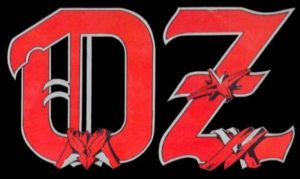
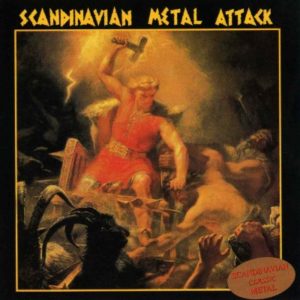
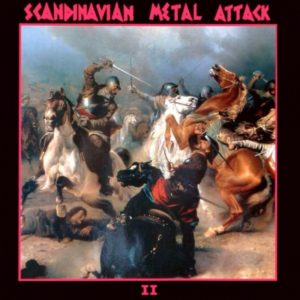
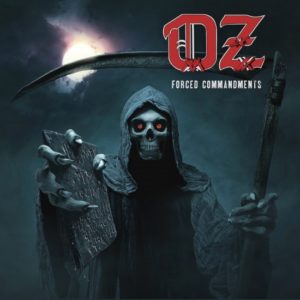
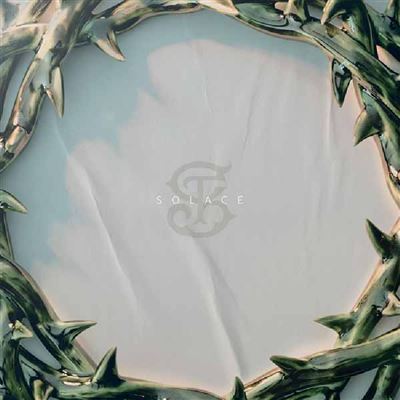
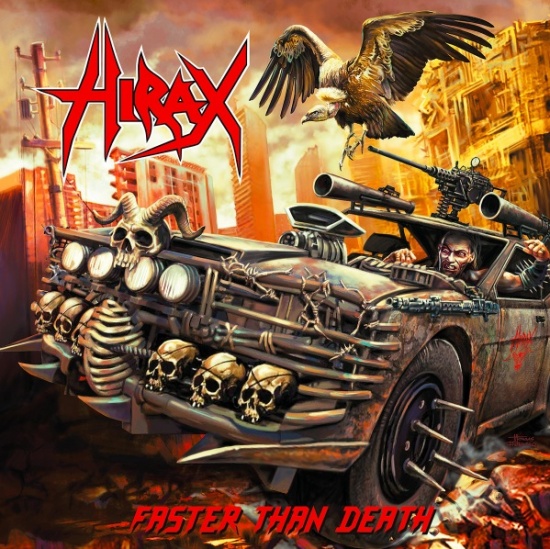
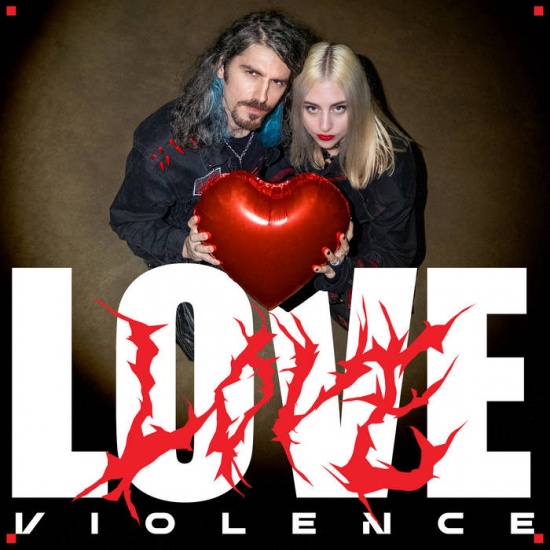
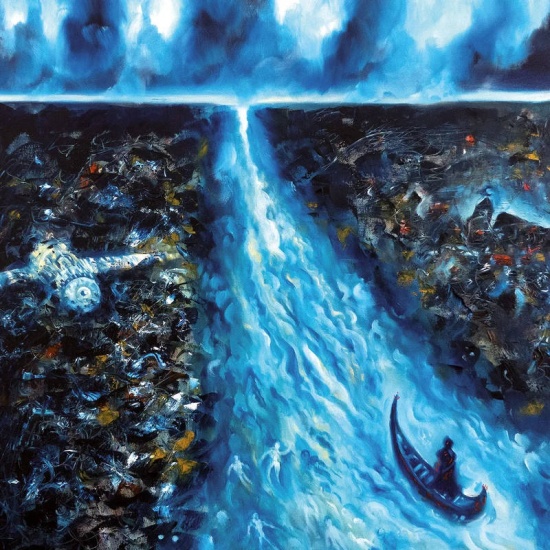
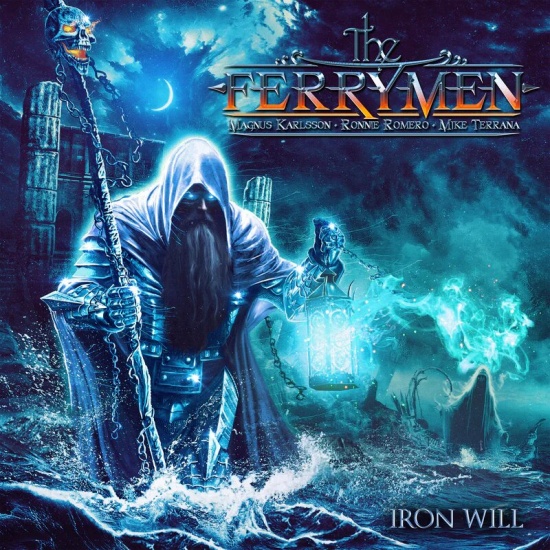
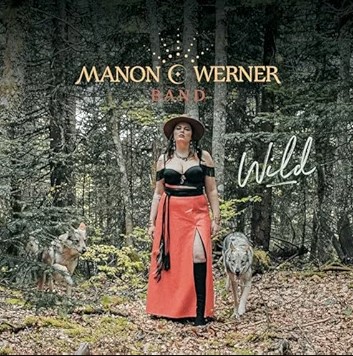
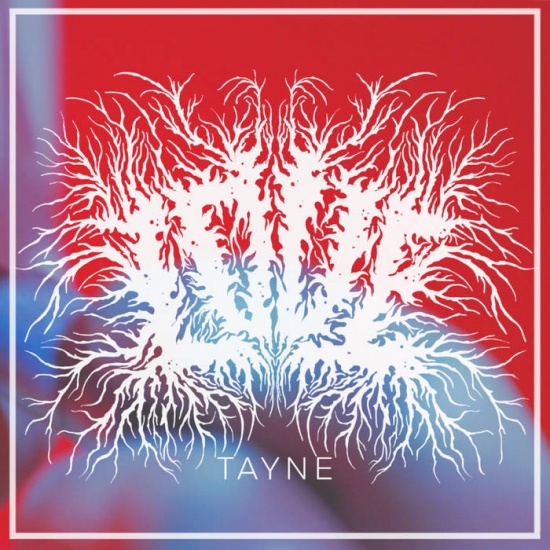


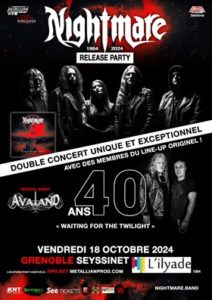
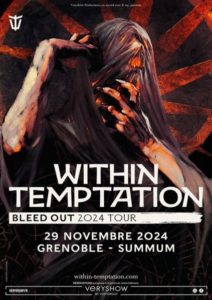
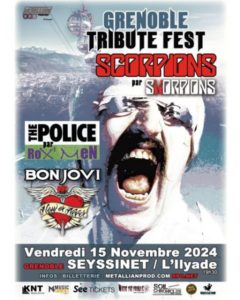
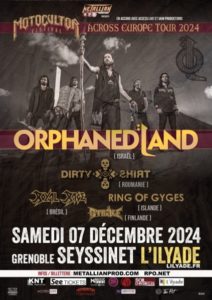
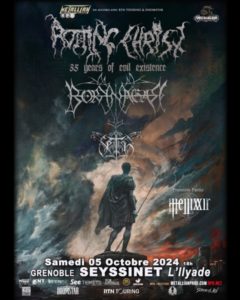
Laissez un commentaire